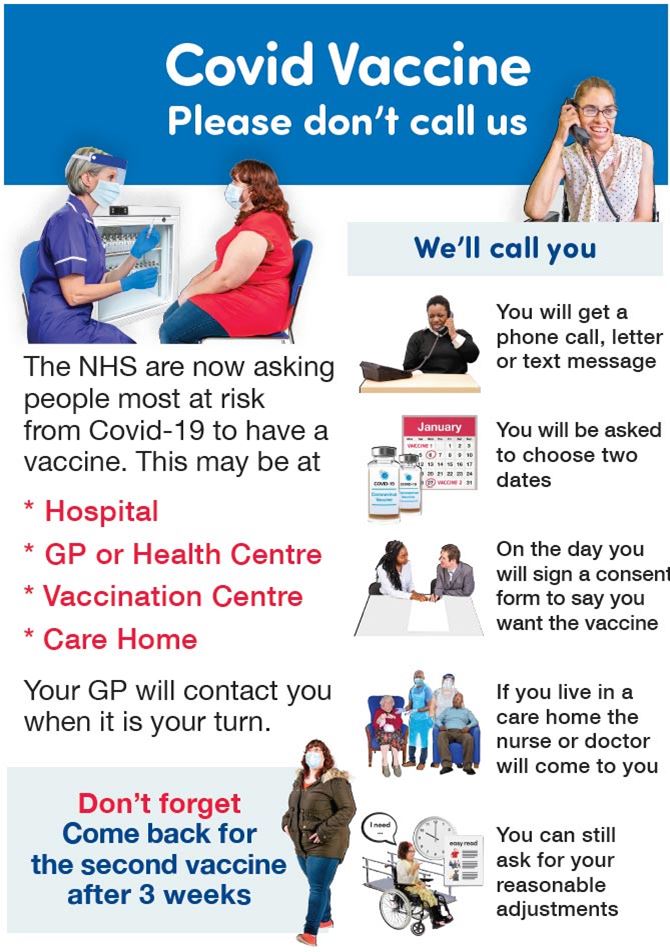Covid Vaccine – FAQs
Covid Vaccine – Your Frequently Asked Questions
1. How does the Covid vaccine work?
Most vaccines work by triggering an immune response from a weakened or inactive germ that causes the disease. The Covid vaccine works by giving our body a set of instructions to make a harmless “spike protein” which will create the antibodies and cells required to fight off coronavirus. As there is no whole or live virus involved, the vaccine cannot cause disease.
2. Why do we need a vaccine for Covid?
There are no drugs known to prevent or cure Covid 19. A few drugs have been found to reduce the death rate from Covid, but only a vaccine can prevent people catching the disease and being ill from it.
3. How effective is the Covid vaccine?
The vaccine is around 95% effective. This means that more than 9 people out of 10 will be prevented from catching Covid if they are vaccinated. This vaccine is more effective than the flu vaccine which is around 70% effective.
4. The Covid vaccine has been developed very quickly. Is it safe?
Most vaccines take some years to develop. The reason the Covid vaccine has been developed quickly is because:
- The researchers already had experience with developing similar vaccines
- Funding (which is normally a barrier) has been readily available
- Multiple teams were working on different parts of the development at the same time
All the normal safety checks have been completed on the Covid vaccine - they were just done at great speed.
5. Will everyone receive the Covid vaccine?
The vaccine will be given to people at highest risk of Covid first.
The priority groups (in order) are:
- Residents and staff in care homes for older people
- ≥ 80 years and health and social care staff
- ≥ 75 years
- ≥ 70 years and the Clinically Extremely Vulnerable groups
- ≥ 65 years
- 16 – 65 years in at- risk groups (those usually eligible for the flu vaccine)
- ≥ 60 years then ≥ 55 years then ≥ 50 years
6. Are there any people who cannot have the Covid vaccine?
- Anyone who has had a serious allergic reaction to a food, medicine, or vaccine
- Pregnant and breastfeeding: pregnancy should be avoided for 2 months after the second dose of vaccine
- Under 16s (but research trials starting in 2021)
- Within 7 days of receiving another vaccine
- Acute, feverish illness
- Within 4 weeks of a Covid type illness
7. Are there any side effects to the Covid vaccine?
The side effects are mild-moderate and only last a few days. Common side effects include:
|
SIDE EFFECT (usually last a few days)
|
NUMBERS OF PEOPLE AFFECTED |
|
Mild pain at injection site |
8 out of 10 |
|
Tiredness |
6 out of 10 |
|
Headache |
5 out of 10 |
|
Chills and muscle pain |
3 out of 10 |
|
Joint pains |
2 out of 10 |
|
Fever |
1 out of 10 |
|
Swollen glands |
Less than 1 out of 10 |
8. Will I have to self-isolate if I have a fever after the Covid vaccine?
No – if you have a fever within the first two days of having the vaccine, and you have no other symptoms of coronavirus, you do not need to self-isolate.
9. How is the Covid vaccine given?
It is usually given in to the muscle of the upper arm and a second dose is given either 21 or 28 days later (depending on the type of vaccine). You will not be fully protected until 7 days after your second dose.
10. Do I still need the vaccine if I think I have had Covid 19?
Yes – it is unknown what level of protection a previous infection can give you, so everyone is encouraged to have the vaccine
11. Will I need a booster of the vaccine at a later stage?
At this stage, boosters are not recommended. It is unclear how long vaccine immunity will last and this will become clearer with further trial data.
12. Will having the vaccine mean I can travel and lead a normal life?
There are no current plans for a Covid vaccine “passport” and normal rules of “hands/face/space” will still apply. This may change as more people get vaccinated and there are less infections present.
